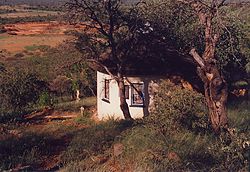
A school is an educational institution designed to provide learning spaces and learning environments for the teaching of students under the direction of teachers. Most countries have systems of formal education, which is sometimes compulsory. In these systems, students progress through a series of schools. The names for these schools vary by country but generally include primary school for young children and secondary school for teenagers who have completed primary education. An institution where higher education is taught is commonly called a university college or university.
Serowe is an urban village in Botswana's Central District. A trade and commercial centre, it is Botswana's third largest village. Serowe has played an important role in Botswana's history, as capital for the Bamangwato people in the early 20th century and as birthplace of several of Botswana's presidents. More recently it has undergone significant development as the town and as Botswana continues to grow.

Palapye is a growing town in Botswana, situated about halfway between Francistown and Gaborone. Over the years its position has made it a convenient stopover on one of Southern Africa's principal north–south rail and road routes.
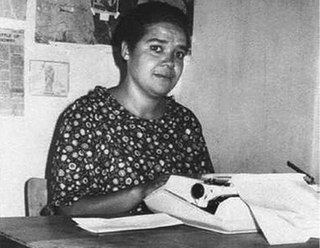
Bessie Amelia Emery Head was a South African writer who, though born in South Africa, is usually considered Botswana's most influential writer. She wrote novels, short fiction and autobiographical works that are infused with spiritual questioning and reflection.

Education in Botswana is provided by public schools and private schools. Education in Botswana is governed by the Ministries of Basic Education. and Tertiary, Research Science and Technology Among sub-Saharan African countries, Botswana has one of the highest literacy rates. According to The World Factbook - Central Intelligence Agency as of 2015, 88.5% of the population age 15 and over can read and write in Botswana were respectively literate.

Central is the largest of Botswana's districts in terms of area and population. It encompasses the traditional homeland of the Bamangwato people. Some of the most politically connected Batswana have come from the Central District, including former President Sir Seretse Khama, former President Festus Mogae, and former President Lt. General Seretse Ian Khama. The district borders the Botswanan districts of Chobe in the north, North-West in the northwest, Ghanzi in the west, Kweneng in southwest, Kgatleng in the south and North-East in the northeast, as well as Zimbabwe also in the northeast and South Africa in the southeast.
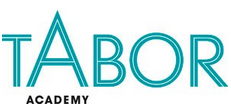
Tabor Academy is a Secondary school with Academy status located in Braintree, Essex, England.
Patrick van Rensburg was a South African-born anti-apartheid activist and educator. In the 1960s, he founded Swaneng Hill School in Serowe, Botswana, and the nationwide Brigades Movement in that country. In the 1980s, he founded the Mmegi national newspaper and the Foundation for Education with Production, which promoted his ideas in South Africa, Botswana, and Zimbabwe. In 1981, he was awarded the Right Livelihood Award "for developing replicable educational models for the third world majority".
Education in Tanzania is provided by both the public and private sectors, starting with pre-primary education, followed by primary, secondary ordinary, secondary advanced, and ideally, university level education. Free and accessible education is a human right in Tanzania. The Tanzanian government began to emphasize the importance of education shortly after its independence in 1961. Curriculum is standardized by level, and it is the basis for the national examinations. Achievement levels are important, yet there are various causes of children not receiving the education that they need, including the need to help families with work, poor accessibility, and a variety of learning disabilities. While there is a lack of resources for special needs education, Tanzania has committed to inclusive education and attention on disadvantaged learners, as pointed out in the 2006 Education Sector Review AIDE-MEMORE. The government's National Strategy for Growth and Reduction of Poverty in 2005 heavily emphasized on education and literacy.

The Portsmouth Academy is a secondary school with academy status, located in Portsmouth, Hampshire, England on St Mary's Road in the central district of Fratton near St Mary's Church. Originally established as a girls' school, it became co-educational in the 2017/18 school year.
David Mathayo David is a Tanzanian CCM politician and Member of Parliament for Same West constituency since 2005. He is the current Minister of Livestock and Fisheries Development.
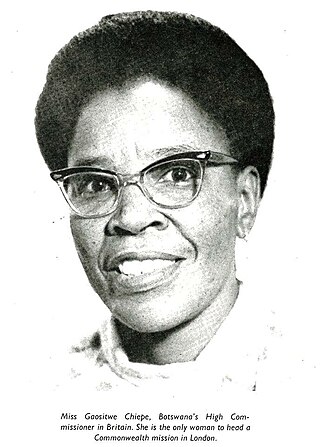
Gaositwe Keagakwa Tibe Chiepe MBE is a Botswana former politician and diplomat with the Botswana Democratic Party. She was her country's high commissioner to the United Kingdom and Nigeria and ambassador to West Germany, France, Denmark, Norway, Sweden and the European Economic Community. She was Botswana's Minister for Trade and Industry in 1977, and in 1984, she became the Foreign Minister. She then served as the Minister for Education from 1994 to 1999.
Servite College is an independent Roman Catholic co-educational secondary day school, located in the Perth suburb of Tuart Hill, Western Australia. The school is operated by the Servite Order.
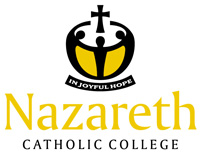
The Nazareth Catholic College is an independent Roman Catholic co-educational primary and secondary day school located across three campuses in suburban Adelaide: a primary school campus in Findon, a high school campus in Flinders Park, and a Year 12 campus also in Underdale, in South Australia, Australia.

Bottisham Village College is a mixed secondary school located in Bottisham, Cambridgeshire, England. The school opened in 1937 as the second village college in part of the Local Director of Education Henry Morris vision for providing education for local people in the countryside around Cambridge.
The Phuthadikobo Museum is a historic building of architectural interest and the museum has a range of displays, a craft shop and a silkscreen printing workshop which are unique to Africa. It is a museum, cultural centre and silkscreen workshop all forming a community development programme – providing all its participants with a place to learn and work since 1975. The emphasis is on the local life, traditions and design of Bakgatla.
Robert Noel Waddington Oakeshott was an English journalist, economist and social reformer who championed a form of workers' co-operation called Employee Ownership. He also had a deep passion for Africa and worked in Zambia and Botswana in the early years of their independence.

Learning space or learning setting refers to a physical setting for a learning environment, a place in which teaching and learning occur. The term is commonly used as a more definitive alternative to "classroom," but it may also refer to an indoor or outdoor location, either actual or virtual. Learning spaces are highly diverse in use, configuration, location, and educational institution. They support a variety of pedagogies, including quiet study, passive or active learning, kinesthetic or physical learning, vocational learning, experiential learning, and others. As the design of a learning space impacts the learning process, it is deemed important to design a learning space with the learning process in mind.

Mater Spei College is a government-aided Catholic secondary school located in Francistown, Botswana. It educates a mixture of boarding and day scholar students in grades (11-12) or form 4 and form 5.
